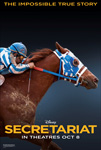M y wife and I went to see the movie ‘Secretariat‘ last night and we were thoroughly entertained. Although I was a teenager when this horse ran for the Triple Crown in 1973, I could still remember some of the details of the story – like the margin of victory in the final, and most difficult, race.
y wife and I went to see the movie ‘Secretariat‘ last night and we were thoroughly entertained. Although I was a teenager when this horse ran for the Triple Crown in 1973, I could still remember some of the details of the story – like the margin of victory in the final, and most difficult, race.
If you haven’t seen the movie, go see it. You know how the races end up ahead of time, after all, the horse did win the Triple Crown. But some of the sub-plots behind the outcomes were quite interesting.
As you know, I work with a lot of students who are trying to figure out what they want to do in life, so I read a lot about generational trends and college graduation rates. I was doing some research this morning on ‘extended adolescence’, and some of the articles I was reading made me think back to the movie last night.
Before anyone goes bananas on me for comparing young adults to race horses, just consider the lessons we can learn, such as:
- Know your strengths(and your weaknesses). The owner of Secretariat, Penny Tweedy, was known for her ability to sense a good horse, and sense whether the horse was sound enough to race. Conversely, the horse’s trainer, Lucien Laurin, nearly scratched the horse from the Kentucky Derby because he wasn’t aware that what was causing him to lose weight unexpectedly was that he had an abscessed tooth. He wouldn’t get close enough to the horse to examine his mouth.We (parents and counselors) often give advice to students without first knowing their true strengths , and using only what we can see from afar or what everyone else can see. We could give them much better help if we first tried to understand their inner strengths, and how those strengths might position them for various career options.
- Setting Expectations. In the movie, many predicted that Secretariatcouldn’t win any of the Triple Crown races because they believed he was bred only for speed, and not for endurance. The three races are a grueling 5 week schedule over increasingly longer racetracks, and most trainers lean toward rest after the second race to allow their horses to recover for the last, and longest, test of endurance. After the Preakness, Laurin surprised Tweedy with a recommendation that they should train the horse hard for the Belmont instead of resting him.His expectation was that Secretariatloved to run, and loved to compete, and that resting him would not have him ready for the last leg of the Triple Crown. What I see oftentimes with students, is that parents (myself included) tend to coddle them instead challenging them to greatness. Especially once they have found their calling, we should encourage them to go all out for it, and not fall back and float along like many of their friends are doing.If everyone else is taking 5 years to graduate, why shouldn’t they? If you know how you are gifted, why not try to maximize that information and see how far you can distance yourself from the field? You have to see the movie to really appreciate how big an impact setting high expectations had on the final race.
- Trends can be powerful. Something I didn’t know when I saw the movie, but I learned today with some additional research, is that Triple Crown winners come in clusters. Once someone accomplishes a rare feat, others think they can do it also. After Secretariat won in ’73, Seattle Slew won in ’77, and Affirmedwon in ’78. And between 1935 and 1948 six different horses won the Triple Crown.Before Roger Bannister ran the first sub-four minute mile in England in 1954, no one thought it was humanly possible – now it has been accomplished hundreds of times, even by some high school athletes.Sometimes, maybe way too often, we set the bar way too low for the younger generation, and don’t realize how the success of one may drive the repeated success of many. How great would it be to be on the front end of a trend toward focused results in college that lead to extraordinary results in a career?
It all starts with helping them to know their strengths…
